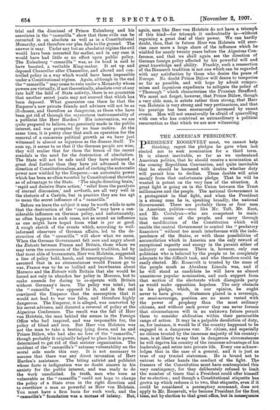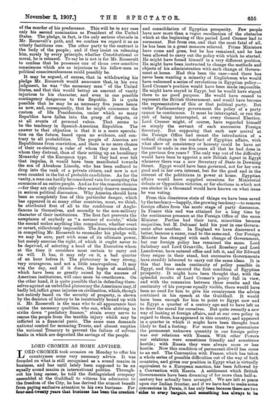THE AMERICAN PRESIDENCY.
PRESIDENT ROOSEVELT must, . we cannot help thinking, regret the pledges he gave when last elected not to seek nomination for a third term. It is almost inevitable, so far as we understand. American politics, that he should receive a nomination at the coming Republican Convention, and quite inevitable that he should be harassed with doubts whether duty will permit him to decline. These doubts will arise mainly from that unfortunate pledge. That he will be wanted is patent on the very face of the situation. A great fight is going on in the Union between the Trust millionaires and the people. The national Government is a protagonist in that fight, and when the President is a strong man he is, speaking broadly, the national Government. There are probably three or four men. in American politics—men like Mr. Taft, Mr. Root, and Mr. Cortelyou—who are competent to main- tain the cause of the people, and carry through that modification of the Constitution which will enable the central Government to control the "predatory financiers" without too much interference with the inde- pendence of the States, or with those possibilities of accumulation which in America are the only reward of exceptional capacity and energy in the pursuit either of industry or commerce. There is, however, only one politician who is believed by the people to be completely adequate to the difficult task, and who therefore could be easily elected. Mr. Roosevelt is trusted by the mass of the people much as Abraham Lincoln was, and if he will stand as candidate he will have an almost unanimous popular nomination, and such support from that section of the electorate which disregards party as would make opposition hopeless. The only obstacle is his pledge, which, in our opinion, he ought never to have given. Statesmen placed in a sovereign, or semi-sovereign, position are no more vested with the power of prophecy than the most ordinary citizens, and without such power they can never foresee that circumstances will in an unknown future permit them to consider abdication within their permissible range of action. It may be a palpable dereliction of duty, as, for instance, it would be if the country happened to be engaged in a dangerous war. No citizen, and especially no citizen trusted by the immense majority of his country- men, is at liberty to say that in dangerous circumstances he will deprive his country of the immense advantage of his leadership, and retire into private life. Every one acknow- ledges that in the case of a. general, and it is just as true of any trusted statesman. He is bound not to entrust to other hands the conduct of the fight. The framers of the Constitution must have contemplated this very contingency, for they deliberately refused to limit, the number of times that a President could offer himself for re-election ; and though a Constitutional etiquette bats grown up which reduces it to two, that etiquette, even if it could be considered a peremptory command, does not apply to Mr. Roosevelt, who became President for the .first, time, not by election to that great office, but in ConsiquenCe of the murder of his predecessor. This will be in any case only his second nomination as President of the United States. The pledge, in fact, is the only serious obstacle in Mr. Roosevelt's path, and we confess we regard it as an utterly factitious one. The other party to the contract is the body of the people ; and if they insist on releasing him, surely by every principle, whether Constitutional or moral, he is released. To say he is not is for Mr. Roosevelt to confess that he possesses one of those over-sensitive consciences which are as injurious to his fellow-men as political consciencelessuess could possibly be.
It may be argued, of course, that in withdrawing his pledge Mr. Roosevelt would announce that, in his own judgment, he was "the necessary man" of the United States, and that this would betray an amount of vanity injurious to his character, and even in one possible contingency dangerous to the Republic. It is quite possible that he may be as necessary five years hence as now, and, consequently, that he might commence the custom of life Presidencies, under which so many Republics have fallen into the grasp of despots, or at all events of personal rulers. That seems to be the tendency in Spanish-American Republics. The answer to that objection is that it is a mere specula- tion on the future, based upon no evidence, and con- trary to all probabilities. The people of America are Republicans from conviction, and there is no more chance of their re-electing a ruler of whom they are tired, or whom they distrust, than of their setting up an hereditary Monarchy of the European type. If they had ever felt that impulse, it would have been manifested towards the son of Abraham Lincoln, who has been suffered to drop into the rank of a private citizen, and now is not even counted in the list of probable candidates. As for the vanity, a man can hardly be considered vain for accepting the summons of an entire people. And as for the remote chances —for they are only chances—they scarcely deserve mention in serious political discussion. Why America should have been so completely free of this particular danger, which has appeared in so many other countries, must, we think, be attributed first of all to the confidence of Anglo- Saxons in themselves, and secondly to the non-military character of their institutions. The first fact prevents the acceptance of anybody as "a saviour of society," while the second makes anything like compulsion, whether overt or covert, ridiculously impossible. The American electorate in compelling Mr. Roosevelt to reconsider his pledge will, we may be sure, part with none of its ultimate power, but merely exercise the right, of which it ought never to be deprived, of selecting a head of the Executive whom at the time it considers most certain to carry out its will. It has, it may rely on it, a bad quarter of an hour before it. The plutocracy is very strong, very courageous, and not a little unscrupulous. It may win the day, and if it does, the hopes of mankind, which have been so greatly raised by the success of American institutions, will once more be overthrown. On the other hand, it is quite possible that in defending them- selves against an unbridled plutocracy the Americans may, if badly led, inflict great injuries on civilisation, which, though not entirely based on the security of property, is shown by the decision of history to be inextricably bound up with it. Mr. Roosevelt is the man who to all appearance best unites the necessary qualities, who can, while striving to strike down "predatory finance," strain every nerve to rescue the people from the terrible injury which may be inflicted in a financial panic. The same man demands national control for menacing Trusts, and almost empties the national Treasury to prevent the failure of solvent banks in which are deposited the savings of the people.































































 Previous page
Previous page